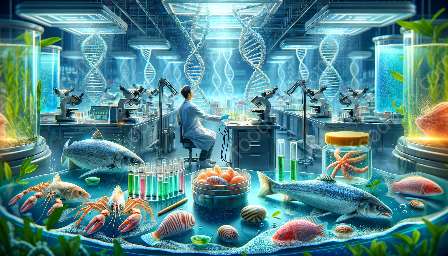Genetic engineering has become a crucial tool in the realm of seafood biotechnology and genetic improvement, particularly in addressing the challenge of disease resistance in seafood. With the increasing demand for seafood, the industry is facing various diseases that can have devastating impacts on aquaculture. In this article, we will explore the innovative and impactful approach of genetic engineering for enhancing disease resistance in seafood, its compatibility with seafood science, and the potential implications for the industry.
The Significance of Disease Resistance in Seafood
The cultivation of seafood, particularly aquaculture, is essential for meeting the growing global demand for high-quality protein. However, the industry is vulnerable to various diseases that can cause substantial economic losses and environmental impacts. Common diseases affecting seafood include bacterial infections, viral diseases, and parasitic infestations, which can result in reduced growth rates, increased mortality, and decreased productivity. This emphasizes the critical need for effective disease management strategies in aquaculture.
Advancements in Seafood Biotechnology and Genetic Improvement
Seafood biotechnology and genetic improvement have emerged as pioneering fields that seek to harness the potential of genetic tools and technologies for enhancing desirable traits in seafood species. Through selective breeding, genomic profiling, and biotechnological interventions, researchers and industry professionals aim to improve traits such as growth performance, feed efficiency, and disease resistance. Genetic improvement programs have contributed to the development of improved seafood strains with enhanced resilience to diseases, thereby bolstering the sustainability and productivity of aquaculture operations.
Genetic Engineering for Disease Resistance in Seafood
Genetic engineering offers a targeted and precise approach to enhance disease resistance in seafood species. By introducing specific genetic modifications, scientists can fortify the immune systems of seafood organisms, making them more resilient to pathogens and diseases. One prominent example is the development of transgenic seafood with heightened immunity against common pathogens, providing a sustainable and environmentally friendly alternative to conventional disease management methods.
Compatibility with Seafood Science
The application of genetic engineering for disease resistance in seafood is intricately linked with the broader field of seafood science. Through interdisciplinary research and collaboration, scientists are able to integrate genetic engineering techniques with principles of seafood nutrition, physiology, and ecology to develop comprehensive solutions for disease management. This collaborative approach ensures that genetic improvement strategies are optimized for the unique biological and environmental characteristics of different seafood species, paving the way for more targeted and effective disease resistance solutions.
Implications for the Seafood Industry
The integration of genetic engineering for disease resistance in seafood has far-reaching implications for the industry. By leveraging biotechnological advancements, aquaculture producers can mitigate the risks associated with diseases, reduce dependency on antimicrobial agents, and enhance the overall health and well-being of cultivated seafood populations. Moreover, the implementation of genetically improved disease-resistant seafood strains can contribute to sustainable intensification of aquaculture, meeting the demands of a growing population while minimizing environmental impacts.
Conclusion
The utilization of genetic engineering for disease resistance in seafood represents a transformative approach that aligns with the goals of seafood biotechnology and genetic improvement. By harnessing the power of genetic tools and scientific knowledge, the industry can proactively address challenges related to disease management and contribute to a more resilient and sustainable future for seafood production.

